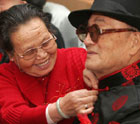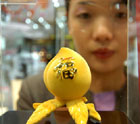Chapter IV: Local Organizations of the Party
Article 24 The Party congress of a province, autonomous region, municipality directly under the Central Government, city divided into districts, or autonomous prefecture is held once every five years.
The Party congress of a county (banner), autonomous county, city not divided into districts, or municipal district is held once every five years.
Local Party congresses are convened by the Party committees at the corresponding levels. Under extraordinary circumstances, they may be held before or after their normally scheduled dates upon approval by the next higher Party committees.
The number of delegates to the local Party congresses at any level and the procedure governing their election are determined by the Party committees at the corresponding levels and should be reported to the next higher Party committees for approval.
Article 25 The functions and powers of the local Party congresses at all levels are as follows:
(1) To hear and examine the reports of the Party committees at the corresponding levels;
(2) To hear and examine the reports of the commissions for discipline inspection at the corresponding levels;
(3) To discuss and decide on major issues in the given areas; and
(4) To elect the Party committees and commissions for discipline inspection at the corresponding levels.
Article 26 The Party committee of a province, autonomous region, municipality directly under the Central Government, city divided into districts, or autonomous prefecture is elected for a term of five years. The members and alternate members of such a committee must have a Party standing of five years or more.
The Party committee of a county (banner), autonomous county, city not divided into districts, or municipal district is elected for a term of five years. The members and alternate members of such a committee must have a Party standing of three years or more.
When local Party congresses at various levels are convened before or after their normally scheduled dates, the terms of the committees elected by the previous congresses shall be correspondingly shortened or extended.
The number of members and alternate members of the local Party committees at various levels shall be determined by the next higher committees. Vacancies on the local Party committees at various levels shall be filled by their alternate members in the order of the number of votes by which they were elected.
The local Party committees at various levels meet in plenary session at least twice a year.
Local Party committees at various levels shall, when the Party congresses of the given areas are not in session, carry out the directives of the next higher Party organizations and the decisions of the Party
Congresses at the corresponding levels, direct work in their own areas and report on it to the next higher Party committees at regular intervals.
Article 27 Local Party committees at various levels elect, at their plenary sessions, their standing committees, secretaries and deputy secretaries and report the results to the higher Party committees for approval. The standing committees of local Party committees at various levels exercise the powers and functions of local Party committees when the latter are not in session. They continue to handle the day-to-day work when the next Party congresses at their levels are in session, until the new standing committees are elected.
Article 28 A prefectural Party committee, or an organization analogous to it, is the representative organ dispatched by a provincial or an autonomous regional Party committee to a prefecture covering several counties, autonomous counties or cities. It exercises leadership over the work in the given region as authorized by the provincial or autonomous regional Party committee.
Chapter V: Primary Organizations of the Party
Article 29 Primary Party organizations are formed in enterprises, rural areas, government departments, schools, scientific research institutes, communities, mass organizations, intermediaries, companies of the People's Liberation Army and other basic units, where there are at least three full Party members.
In primary organizations, primary Party committees and committees of general Party branches or Party branches are set up as the work requires and according to the number of Party members, subject to approval by the higher Party organizations. A primary Party committee is elected by a general membership meeting or a delegate meeting. The committee of a general Party branch or a Party branch is elected by a general membership meeting.
Article 30 A Primary Party committee is elected for a term of three to five years, while a general Party branch committee or a Party branch committee is elected for a term of two or three years. Results of the election of a secretary and deputy secretaries by a primary Party committee, general branch committee or branch committee shall be reported to the higher Party organizations for approval.
Article 31 The primary Party organizations are militant bastions of the Party in the basic units of society, where all the Party's work proceeds and they serve as the foundation of its fighting capacity. Their main tasks are:
(1) To disseminate and carry out the Party's line, principles and policies, the decisions of the Central Committee of the Party and other higher Party organizations, and their own decisions; to give full play to the exemplary, vanguard role of Party members, and to unite and organize the cadres and the rank of file inside and outside the Party to fulfill the tasks of their own units.
(2) To organize Party members to conscientiously study Marxism-Leninism, Mao Zedong Thought, Deng Xiaoping Theory, the important thought of Three Represents, the Party's line, principles, policies and decisions, acquire essential knowledge concerning the Party and obtain general, scientific and professional knowledge.
(3) To educate and supervise Party members, raise the overall quality of the Party membership, cultivate their Party spirit, ensure their regular participation in the activities of the Party organizations, make criticism and self-criticism, maintain and observe Party discipline, see that Party members truly fulfill their duties and protect their rights from encroachment.
(4) To maintain close ties with the masses, constantly seek their criticisms and opinions regarding Party members and the Party's work, safeguard the legitimate rights and interests of the masses and do effective ideological and political work among them.
(5) To give full scope to the initiative and creativeness of Party members and the masses and to discover, nurture and recommend fine, talented people from among Party members and the masses and encourage them to contribute their skills and learning to the reform, opening up and the socialist modernization drive.
(6) To educate and train the activists who apply for Party membership, attend to the routine work concerning the recruitment of new members and attach great importance to recruiting Party members from among those in the forefront of production and work and from among young people.
(7) To see to it that Party and non-Party cadres strictly observe the law and administrative discipline and the financial and economic statutes and personnel regulations of the state and that none of them infringe on the interests of the state, the collective or the masses.
(8) To encourage Party members and the masses to conscientiously resist unhealthy practices and wage resolute struggles against all illegal and criminal activities.
Article 32 The primary Party committees in communities, townships and towns and the Party organizations in villages and communities provide leadership for the work in their localities and assist administrative departments, economic institutions and self-governing mass organizations in fully exercising their functions and powers.
In a state-owned or collective enterprise, the primary Party organization acts as the political nucleus and works for the operation of the enterprise. The primary Party organization guarantees and supervises the implementation of the principles and policies of the Party and the state in its own enterprise and backs the meeting of shareholders, board of directors, board of supervisors and manager (factory director) in the exercise of their functions and powers according to law. It relies wholeheartedly on the workers and office staff, supports the work of the congresses of representatives of workers and office staff and participates in making final decisions on major questions in the enterprise. It works to improve its own organization and provides leadership over ideological and political work, efforts for cultural and ethical progress and the trade unions, the Communist Youth League and other mass organizations.
In a non-public economic institution, the primary Party organization carries out the Party's principles and policies, provides guidance to and supervises the enterprise in observing the laws and regulations of the state, exercises leadership over the trade union, the Communist Youth League organization and other mass organizations, rallies the workers and office staff around it, safeguards the legitimate rights and interests of all quarters and stimulates the healthy development of the enterprise.
In an institution where the administrative leaders assume full responsibility, the primary Party organization acts as the political nucleus. In an institution where the administrative leaders assume full responsibility under the leadership of the Party committee, the primary Party organization discusses and decides on major issues and at the same time ensures that the administrative leaders are able to fully exercise their functions and powers.
In offices of the Party or the state at all levels, the primary Party organizations assist the chief administrators in fulfilling their tasks and improving their work. They exercise supervision over all Party members, including the chief administrators who are Party members, but do not direct the work of their units.











